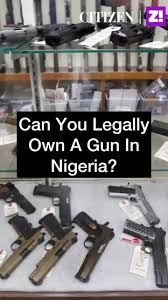Introduction
- Purpose of the Guide: This guide provides an in-depth analysis of the legal requirements and procedures for acquiring a firearm license in Nigeria. It covers essential steps, eligibility criteria, and clarifies common questions, while emphasising the importance of compliance in a country where security is a top concern.
- Importance of a Gun License: While Nigeria’s security landscape may prompt interest in self-defense options, firearm ownership requires stringent legal adherence. This article outlines every aspect of the process and procedures necessary to legally obtain and maintain a gun license.
Section 1: Understanding Firearm Licensing in Nigeria
- Legal Framework and Eligibility
- Regulatory Context: The acquisition and use of firearms are governed by Nigeria’s Firearms Act (1959) and related regulations, mandating strict control for public safety.
- Eligibility: Applicants must be at least 35 years old, although other eligibility criteria mention applicants aged 18 or older. They must also:
- Have no criminal record.
- Provide a medical certificate confirming both physical and mental fitness.
- Permitted Firearms: Civilian licenses are typically limited to shotguns, as revolvers and pistols are restricted to police and armed forces personnel.
Section 2: Documentation Required for a Gun License in Nigeria
- Mandatory Documentation
- Identity Verification: Four recent passport-size photos and government-issued ID.
- Proof of Address: Utility bills, voter ID, or National Identification Card.
- Date of Birth Verification: Birth certificate or sworn affidavit for applicants with limited documentation.
- Police Clearance: Applicants must provide a police clearance certificate as proof of good standing.
- Medical Fitness Reports: Two medical reports are required:
- A general mental health evaluation.
- A chest examination to ensure physical capability for firearm handling.
Section 3: Step-by-Step Process for Acquiring a Gun License in Nigeria
- Step 1: Submission of Application
- Applicants must apply directly to the Commissioner of Police in their state of residence, where they will complete forms with necessary biodata, including:
- Full name and address.
- Reasons for needing a firearm.
- Date of birth (ensuring compliance with age restrictions).
- Along with the application, applicants must provide the above-listed documents and medical reports.
- Applicants must apply directly to the Commissioner of Police in their state of residence, where they will complete forms with necessary biodata, including:
- Step 2: Background Checks and Security Screening
- The Nigerian Police Force will conduct thorough background checks to verify the applicant’s criminal history and general eligibility.
- Step 3: Interview and Evaluation
- Applicants undergo an interview process where they must demonstrate knowledge of firearms laws, intended firearm use, and commitment to safe handling practices.
- Step 4: Safety and Handling Training
- As part of the licensing process, successful applicants must complete accredited firearm handling and safety training.
- Step 5: License Issuance
- Following all approvals, the license is issued in booklet form, bearing one of the applicant’s passport photos and stamped by the state police headquarters.
Section 4: Maintaining a Gun License in Nigeria
- Annual Renewal Process
- Gun licenses in Nigeria are subject to annual renewal, generally with a nominal fee to keep the license valid.
- License Validity Period
- Initially valid for 60 days, the license can be renewed to last 1–2 years. Renewal ensures compliance with changing laws or updates in the applicant’s status.
Section 5: Gun Types and Legal Purchase Options
- Permitted Firearms
- Licensed individuals may acquire shotguns legally, while pistols and revolvers remain restricted to military and law enforcement.
- Where to Buy Firearms Legally
- Legal Purchase Point: The Nigerian Police Force Operations Department is the only authorised place to legally purchase firearms in Nigeria.
- Underground Market Risks: Although there are illegal routes to acquire firearms, these are unlawful and carry severe penalties.
Section 6: Additional Notes on Firearm Ownership in Nigeria
- Prices for Firearms
- Legally purchased shotguns vary in price based on location and specifications.
- License Processing Time
- Application processing typically takes between 6 months to 1 year, reflecting the rigorous screening and approval required.
FAQs (Curated from “People Also Ask”)
- What is the minimum age requirement to apply for a gun license in Nigeria?
- Legally, applicants must be at least 35 years old. However, other documentation might reference an age of 18, which is inconsistent with current regulatory practice.
- What are the main reasons for acquiring a gun license in Nigeria?
- Common reasons include personal protection, hunting, and sporting activities, but each applicant must demonstrate a lawful purpose for firearm ownership.
- Can foreign nationals apply for a gun license in Nigeria?
- Foreign nationals may face stricter regulations and must adhere to the same security and background checks as Nigerian citizens.
- Is there mandatory training for licensed firearm owners in Nigeria?
- Yes, training in firearm safety and handling is required to ensure responsible ownership.
- What types of firearms are civilians allowed to possess in Nigeria?
- Civilian licenses in Nigeria generally allow only for shotguns; higher-caliber firearms are restricted to official use.
Conclusion
- Summary: Obtaining a firearm license in Nigeria requires strict adherence to legal protocols, background checks, and training. Compliance with the application, verification, and renewal processes is essential for lawful firearm ownership.
- Final Thoughts: As firearm ownership in Nigeria is highly regulated, applicants should ensure they follow all legal guidelines and seek professional advice where necessary to maintain compliance.


